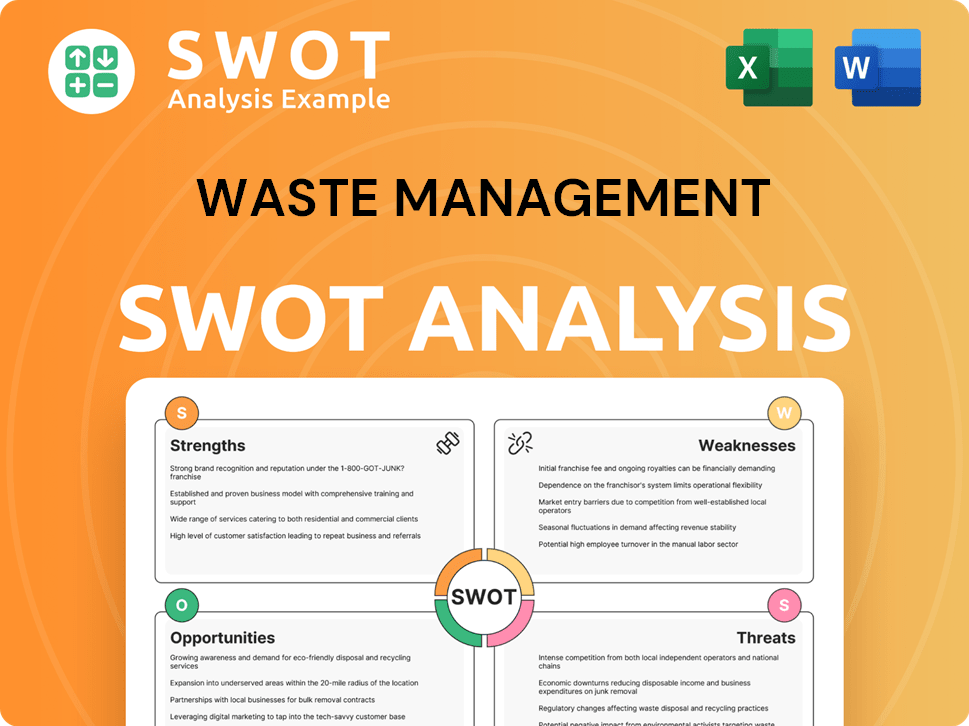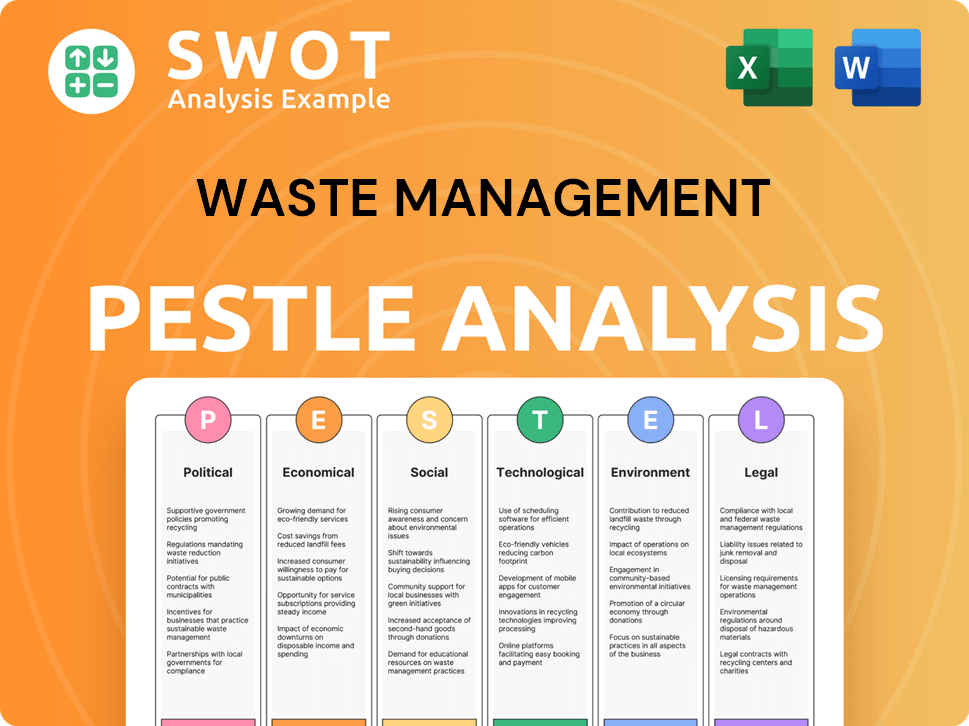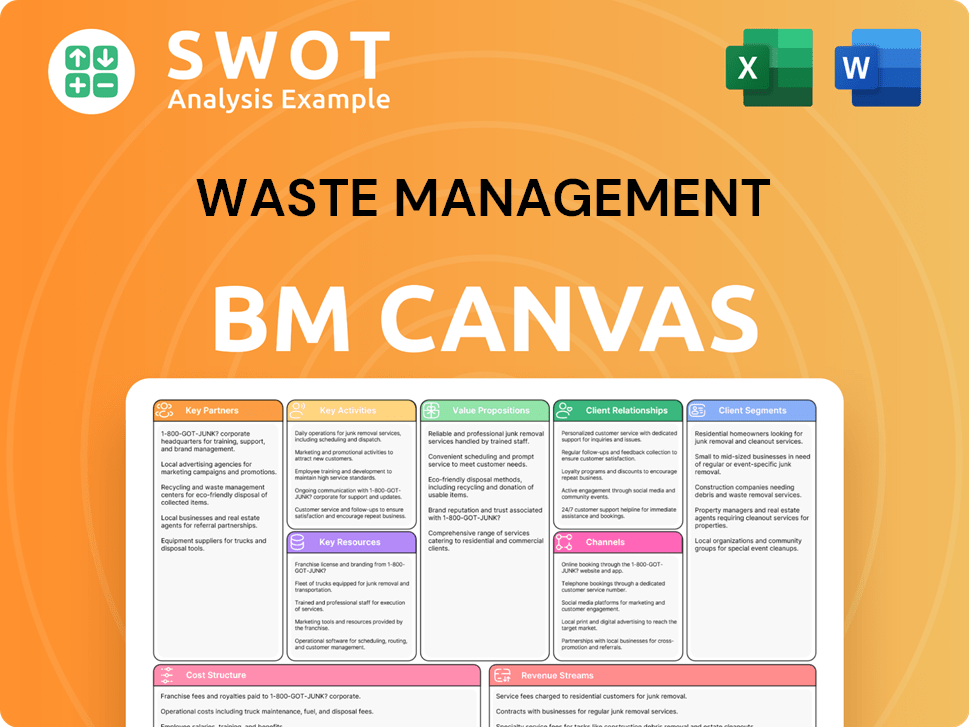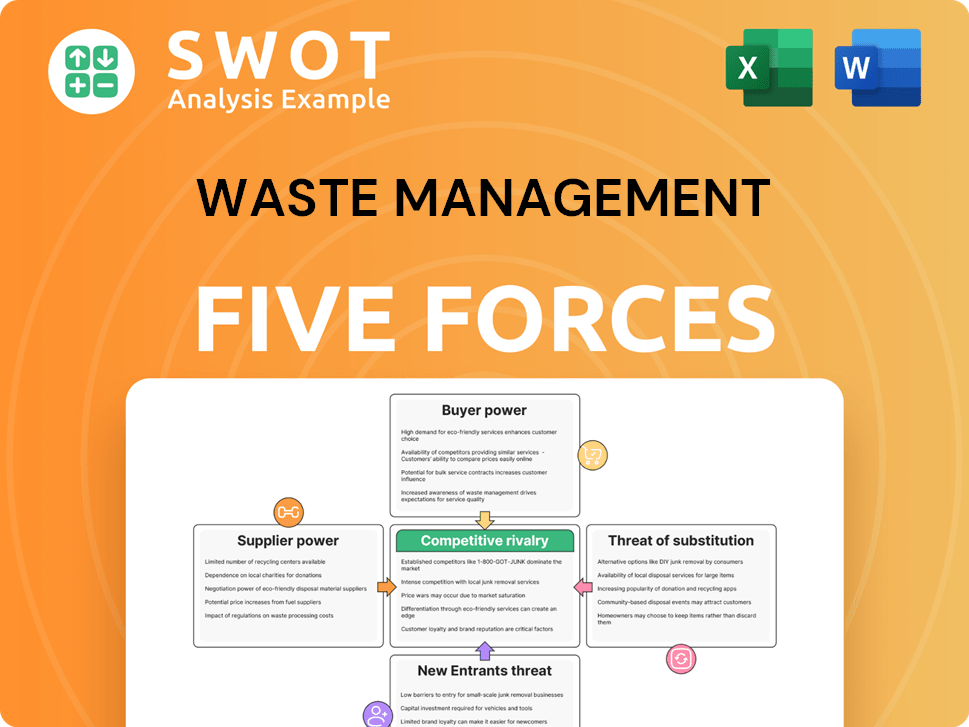Waste Management Bundle
What Drives Waste Management's Strategy?
Understanding a company's core principles is crucial for investors and stakeholders alike. Waste Management's mission, vision, and core values provide a vital framework for understanding its strategic direction and commitment to Waste Management SWOT Analysis. These elements are especially important in the dynamic waste management industry.

As the waste management sector evolves, driven by growing populations and increased environmental awareness, Waste Management's commitment to Environmental Sustainability and Corporate Social Responsibility becomes even more critical. Their mission and vision statements, along with their Core Values, shape their approach to Waste Disposal Ethics and guide their contribution to a cleaner planet. Exploring these elements illuminates how Waste Management navigates the challenges and opportunities within this vital industry, influencing everything from daily operations to long-term strategic planning, and ultimately impacting their role in a circular economy.
Key Takeaways
- Waste Management's mission, vision, and values guide its strategy and identity.
- Environmental stewardship, customer focus, safety, and integrity are core to their operations.
- They are investing in sustainable technologies and acquisitions for growth.
- Alignment with guiding principles is key for future success in waste management.
- The industry's role in public health and sustainability is crucial.
Mission: What is Waste Management Mission Statement?
Waste Management's mission is 'to provide integrated waste and environmental services that protect and improve the environment for future generations.'
The mission of Waste Management is a cornerstone of its operations, guiding its strategic direction and influencing its interactions with stakeholders. This mission statement underscores the company's commitment to environmental stewardship and sustainable practices, shaping its approach to waste management and its role in the broader community.
The mission statement encapsulates several key elements. It emphasizes providing "integrated waste and environmental services," which includes collection, transportation, processing, recycling, and disposal. It also highlights the commitment to "protect and improve the environment for future generations," a clear focus on long-term sustainability and environmental responsibility. This commitment is central to understanding the company's approach to Waste Management Mission.
Waste Management serves a diverse customer base, including residential, commercial, industrial, and municipal entities. The services offered are comprehensive, covering the entire waste management lifecycle. This includes not only traditional waste disposal but also advanced solutions such as recycling, waste-to-energy projects, and the development of renewable natural gas facilities. This broad scope reflects the company's dedication to Environmental Sustainability.
A critical aspect of Waste Management's mission is its focus on sustainable practices. This involves minimizing environmental impact through various strategies, such as reducing landfill waste, promoting recycling, and investing in renewable energy projects. The company's investments in sustainability growth projects, like the completion of five renewable natural gas facilities and 12 recycling automation and growth projects in 2024, demonstrate a tangible commitment to these goals. This is crucial for understanding the company's commitment to Waste Disposal Ethics.
Waste Management aims to maximize the value of resources while minimizing environmental harm. This approach is evident in its efforts to recover materials for recycling, generate energy from landfill gas, and develop innovative waste management solutions. This focus aligns with the principles of a circular economy, where waste is viewed as a resource. This is part of the company's contribution to environmental goals.
The company's mission extends beyond operational efficiency to encompass community well-being and environmental protection. Waste Management strives to be a responsible corporate citizen, contributing to cleaner, healthier communities. This includes initiatives to reduce emissions, improve air and water quality, and support local environmental projects. The company’s commitment is also reflected in its approach to Corporate Social Responsibility.
Waste Management's mission statement guides its strategic decisions, influencing investments in infrastructure, technology, and sustainability initiatives. For example, the company has been actively expanding its recycling capabilities and investing in renewable energy projects. In 2023, Waste Management recycled approximately 15.5 million tons of materials. This mission-driven approach is vital for long-term success and is a key element in the Brief History of Waste Management.
The mission of Waste Management is a dynamic framework that drives its operations and strategic direction. It reflects a commitment to environmental stewardship, sustainable practices, and the creation of value for both its customers and the communities it serves. The company continues to evolve its strategies and invest in innovative solutions to meet the challenges of waste management and contribute to a cleaner, healthier planet. This is a key part of their Waste Management Core Values.
Waste Management SWOT Analysis
- Complete SWOT Breakdown
- Fully Customizable
- Editable in Excel & Word
- Professional Formatting
- Investor-Ready Format

Vision: What is Waste Management Vision Statement?
Waste Management's vision is 'to be the leading provider of sustainable waste management solutions that protect and enhance the environment for future generations. We strive to create a world where waste is minimized, resources are conserved, and communities thrive in a clean and healthy environment.'
Let's delve into the profound implications of Waste Management's vision, exploring its components and significance in the context of the evolving waste management industry. Understanding the Waste Management Vision is crucial for investors, stakeholders, and anyone interested in the future of environmental sustainability.
The vision statement is undeniably future-focused, setting a high bar for the company. It aims to lead the industry in sustainable practices, a goal that requires continuous innovation and adaptation. This forward-thinking approach is critical in a sector undergoing rapid technological advancements and increasing regulatory scrutiny.
The vision extends beyond mere waste disposal. It encompasses minimizing waste generation, conserving resources, and fostering healthy communities. This holistic approach reflects a commitment to Environmental Sustainability and Corporate Social Responsibility, key aspects of modern business strategy.
Waste Management's vision strongly aligns with the growing global emphasis on a circular economy. This model prioritizes waste reduction, reuse, and recycling, moving away from the traditional linear "take-make-dispose" approach. This strategic alignment positions the company well for future growth.
The emphasis on "sustainable waste management solutions" highlights the company's commitment to environmental protection. This includes investments in renewable energy projects, landfill gas-to-energy initiatives, and advanced recycling technologies. These efforts are vital for reducing the company's carbon footprint.
While aspirational, the vision provides a framework for setting measurable goals. Waste Management can track its progress by monitoring waste diversion rates, the amount of renewable energy generated, and the reduction in greenhouse gas emissions. These metrics demonstrate the company's commitment to its vision.
The vision statement impacts various stakeholders, including employees, customers, and communities. For employees, it provides a sense of purpose and direction. For customers, it offers assurance of responsible waste management. For communities, it signifies a commitment to a healthier environment.
The Waste Management Mission and Waste Management Core Values work in tandem with the vision to guide the company's actions and decisions. The vision provides the long-term direction, while the mission defines the current purpose, and the core values establish the guiding principles. For instance, Waste Management's commitment to safety, as reflected in its core values, is essential for achieving its vision of creating a clean and healthy environment. Furthermore, understanding the perspective of Owners & Shareholders of Waste Management is crucial in evaluating the company's strategic direction and financial performance in relation to its vision.
Waste Management PESTLE Analysis
- Covers All 6 PESTLE Categories
- No Research Needed – Save Hours of Work
- Built by Experts, Trusted by Consultants
- Instant Download, Ready to Use
- 100% Editable, Fully Customizable

Values: What is Waste Management Core Values Statement?
Understanding Waste Management's commitment to its core values is crucial for grasping its operational philosophy and its approach to environmental stewardship. These values are the bedrock upon which the company builds its strategies and interacts with its stakeholders, reflecting its dedication to responsible waste disposal and a sustainable future.
Waste Management champions diversity and inclusion, fostering a culture of respect and open communication. This value ensures that all employees have opportunities for growth and development, supporting career aspirations through training and education. This commitment is reflected in their diverse workforce and inclusive workplace practices, which are essential for driving innovation and achieving operational excellence.
Waste Management prioritizes its customers, striving to exceed their expectations daily. This customer-centric approach is evident in the development of customized waste management solutions, ensuring that the company meets the unique needs of each client. By focusing on customer satisfaction, Waste Management builds strong, long-lasting relationships and enhances its reputation in the industry.
Safety is a non-negotiable core value for Waste Management, forming the foundation of all its operations. The company implements rigorous safety protocols and comprehensive training programs to protect its employees and the communities it serves. This commitment to safety is paramount in an industry with inherent risks, ensuring operational integrity and minimizing potential hazards.
Waste Management is deeply committed to environmental sustainability, acting as a responsible steward of the planet. This commitment drives investments in renewable energy and recycling technologies, with the company aiming to increase the amount of waste diverted from landfills. This focus on environmental sustainability is central to its mission and vision, contributing to a cleaner, healthier future.
Waste Management's core values are not just statements; they are the guiding principles that shape its actions and define its identity. These values underscore the company's commitment to ethical conduct, environmental responsibility, and customer satisfaction. Next, we'll explore how the company's mission and vision influence its strategic decisions.
How Mission & Vision Influence Waste Management Business?
Waste Management's mission and vision are not just aspirational statements; they are the bedrock upon which the company builds its strategic decisions. These guiding principles shape every facet of the business, from acquisitions to operational investments.
The Waste Management Mission, centered around environmental stewardship, directly influences the company's strategic direction. This commitment is evident in their investments and acquisitions.
- Acquisition of Stericycle in 2024 for $7.2 billion expanded their offerings in healthcare waste management and secure information destruction, aligning with their mission to provide integrated environmental services.
- Plans to close on over $500 million in solid waste acquisitions in 2025, indicating a continued focus on scaling their core business.
- Investment in renewable natural gas facilities and recycling automation projects demonstrates their commitment to their vision of maximizing resource value and minimizing environmental impact.
- Focus on disciplined pricing and cost optimization in their collection and disposal business reflects the need for operational efficiency to support their sustainability investments.
Waste Management's emphasis on Environmental Sustainability is a primary driver in its strategic planning. This focus is reflected in their investments in renewable energy and recycling initiatives.
The company's commitment to operational efficiency, including disciplined pricing and cost optimization, ensures the financial viability of their sustainability investments. This approach supports their long-term vision.
Leadership's emphasis on improving the core business and expanding sustainability platforms reinforces the importance of Waste Management Core Values within the organization. CEO James Fish's comments underscore this commitment.
Every strategic decision, from acquisitions to operational improvements, is filtered through the lens of their mission and vision. This ensures alignment with their goals for a sustainable future.
Waste Management's investments in renewable energy and recycling initiatives directly contribute to achieving their sustainability ambitions. These actions demonstrate their commitment to reducing their environmental footprint.
Waste Management's long-term vision includes maximizing resource value and minimizing environmental impact. This vision guides their investments in innovative technologies and sustainable practices, ensuring they remain at the forefront of the industry.
In essence, the Waste Management Vision and mission are not just words; they are the blueprints for the company's future. To delve deeper into how the company can improve its mission and vision, read the next chapter: Mission, Vision & Core Values of Waste Management: Core Improvements to Company's Mission and Vision.
Waste Management Business Model Canvas
- Complete 9-Block Business Model Canvas
- Effortlessly Communicate Your Business Strategy
- Investor-Ready BMC Format
- 100% Editable and Customizable
- Clear and Structured Layout

What Are Mission & Vision Improvements?
While Waste Management's current statements provide a solid foundation, strategic refinements can ensure they remain at the forefront of the evolving waste management landscape. These improvements focus on aligning the company's guiding principles with emerging trends and stakeholder expectations for a more sustainable future.
To enhance its Waste Management Vision, explicitly incorporating circular economy principles is crucial. This could involve setting measurable targets for resource recovery, waste diversion rates, and the development of closed-loop systems, moving beyond traditional Waste Disposal Ethics. For example, Waste Management could aim to increase the percentage of collected materials that are recycled or reused, aligning with the growing global focus on reducing waste and promoting resource efficiency. This is especially important as the global circular economy market is projected to reach $4.5 trillion by 2030, according to recent reports.
The Waste Management Mission should be updated to reflect the increasing importance of technology in the industry. Emphasizing the adoption of smart waste management solutions, such as AI-powered sorting systems and IoT-enabled waste collection, will showcase the company's commitment to efficiency and Environmental Sustainability. This includes investing in research and development to explore advanced waste-to-energy technologies and data analytics for optimized route planning, which can reduce fuel consumption and emissions.
The Waste Management Core Values should be expanded to highlight the company's role in helping customers achieve their sustainability objectives. This involves providing tailored waste management solutions that support corporate zero-waste initiatives and compliance with evolving environmental regulations. Furthermore, this can include offering consulting services to help customers optimize their waste streams and reduce their environmental footprint, which is increasingly important as companies face greater pressure to demonstrate their commitment to Corporate Social Responsibility.
While Waste Management likely already engages in community initiatives, explicitly stating a commitment to community well-being within its mission or vision is beneficial. This could involve supporting local environmental projects, promoting education on waste reduction, and ensuring transparent communication with communities about its operations. This commitment can be further enhanced by investing in community programs, such as educational initiatives and environmental clean-up drives, and by fostering open communication channels to address community concerns. To understand how Waste Management generates revenue, you can read more about their business model in this article: Revenue Streams & Business Model of Waste Management.
How Does Waste Management Implement Corporate Strategy?
The successful implementation of a company's mission, vision, and core values is crucial for achieving strategic goals and fostering a strong corporate culture. Waste Management's approach to integrating these guiding principles into its operations offers a compelling case study in how a large organization can translate its aspirations into tangible actions.
Waste Management demonstrates its commitment to its Marketing Strategy of Waste Management through strategic business initiatives that reflect its mission and vision. These initiatives are designed to promote Environmental Sustainability and responsible Waste Disposal Ethics.
- Renewable Energy Investments: Waste Management is actively investing in renewable natural gas (RNG) facilities. As of the latest reports, seven out of 20 planned facilities have been completed. This investment directly supports the company's commitment to renewable energy and reducing its environmental footprint.
- Recycling Automation and Expansion: The company is focused on enhancing its recycling capabilities. By the end of 2024, 12 recycling automation and growth projects were completed, representing a significant portion of the 25 out of 39 planned projects. This aligns with the vision for a sustainable waste management future and maximizing material repurposing.
- Strategic Acquisitions: The acquisition of Stericycle is a strategic move to provide integrated environmental solutions. This expansion of services supports the company's vision and its commitment to Corporate Social Responsibility.
Leadership plays a vital role in reinforcing the Waste Management Mission and Vision. CEO James Fish has consistently emphasized the importance of improving the core business and expanding sustainability platforms. This top-down approach ensures that the company's strategic direction aligns with its stated values.
While specific details on formal programs for communicating the Waste Management Core Values to all stakeholders were not readily available in the provided data, it is common for companies to utilize various communication channels. These typically include internal communications, training programs, and public reporting to ensure alignment across the organization and with external stakeholders.
Waste Management's investor relations website provides access to annual reports and sustainability reports. These reports likely detail the company's efforts to align its stated values with its business practices, providing transparency to investors and the public. This approach helps build trust and demonstrates the company's commitment to its mission.
The emphasis on employee engagement as a core value suggests that programs are in place to involve employees in achieving sustainability goals. This could include training, incentives, and opportunities for employees to contribute to the company's environmental initiatives. Engaging employees is crucial for the successful implementation of the Waste Management Mission and Vision.
Waste Management Porter's Five Forces Analysis
- Covers All 5 Competitive Forces in Detail
- Structured for Consultants, Students, and Founders
- 100% Editable in Microsoft Word & Excel
- Instant Digital Download – Use Immediately
- Compatible with Mac & PC – Fully Unlocked

Related Blogs
- What are Mission Vision & Core Values of Waste Management Company?
- What is Competitive Landscape of Waste Management Company?
- What is Growth Strategy and Future Prospects of Waste Management Company?
- How Does Waste Management Company Work?
- What is Sales and Marketing Strategy of Waste Management Company?
- Who Owns Waste Management Company?
- What is Customer Demographics and Target Market of Waste Management Company?
Disclaimer
All information, articles, and product details provided on this website are for general informational and educational purposes only. We do not claim any ownership over, nor do we intend to infringe upon, any trademarks, copyrights, logos, brand names, or other intellectual property mentioned or depicted on this site. Such intellectual property remains the property of its respective owners, and any references here are made solely for identification or informational purposes, without implying any affiliation, endorsement, or partnership.
We make no representations or warranties, express or implied, regarding the accuracy, completeness, or suitability of any content or products presented. Nothing on this website should be construed as legal, tax, investment, financial, medical, or other professional advice. In addition, no part of this site—including articles or product references—constitutes a solicitation, recommendation, endorsement, advertisement, or offer to buy or sell any securities, franchises, or other financial instruments, particularly in jurisdictions where such activity would be unlawful.
All content is of a general nature and may not address the specific circumstances of any individual or entity. It is not a substitute for professional advice or services. Any actions you take based on the information provided here are strictly at your own risk. You accept full responsibility for any decisions or outcomes arising from your use of this website and agree to release us from any liability in connection with your use of, or reliance upon, the content or products found herein.